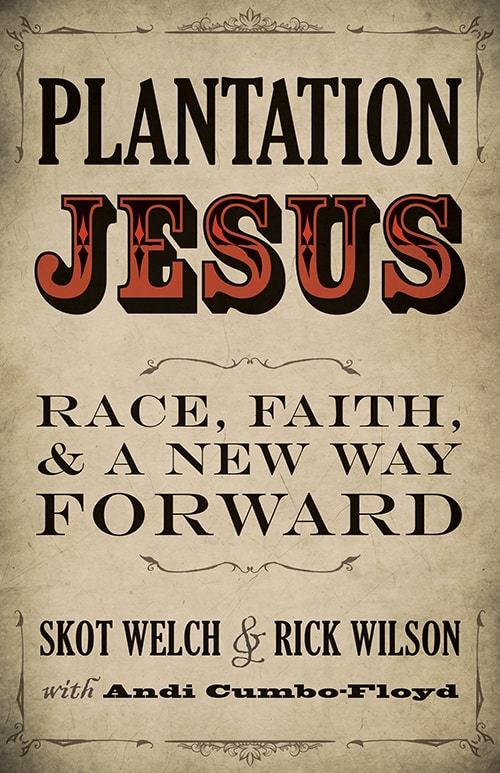
Editor’s Note: This is the second installment in a two-part series. To read the first article, click here.
When talking about race, have you ever heard—or made—any of these claims? Let’s examine these statements carefully.
1. “We’re all Americans”
This statement crashed a conversation with a friend of ours about the differences in experience between whites and blacks in American history. Our friend lived in one of western Michigan’s most affluent suburbs and had no contact at all with anyone other than white people. Yet his statement—“We’re all Americans”—claimed that everyone’s experience of America was the same as his experience as a white upper-middle-class man. Given his economic and racial isolation, he couldn’t possibly know if all Americans were treated equally, as his statement implied. But his refusal to own his own ignorance and his dismissal of experiences that did not match his own were instantaneous. His response was almost instinctual, and was rooted in his desire to not see what didn’t support his own experience. He preferred to stay within his own bubble of racial and economic privilege rather than acknowledge that others might have experiences different from his. His experience wasn’t that of someone quintessentially American.
In her influential essay “White Privilege: Unpacking the Invisible Knapsack,” scholar Peggy McIntosh writes about the experiential side of racial disparities. She argues that white people in American culture are perceived as more valuable and less threatening than those who share the same citizenship and birthright in the United States but have a darker skin tone. This is the fundamental root of white privilege and the systems of white supremacy. As McIntosh contends, white people can choose to be in the company of their own race most of the time. In contrast, black and brown Americans are forced to interact in a dominant culture that has little contact with or understanding of them. White Americans can often purchase housing in an area they can afford and in which they want to live. Americans of color are often trapped in ghettos and denied access to quality neighborhoods even when they have the means to live there.
As McIntosh points out, white Americans can shop alone and be confident that they will not be harassed, bothered, and immediately placed under suspicion. Black and brown Americans are quickly perceived to be a security risk in all kinds of retail venues and experience all the trouble connected with Shopping While Black.
White Americans can turn on their television sets or look at newspapers and magazines and see their ethnicity widely and well-represented. Black and brown Americans are most often depicted in mug shots and perp walks that reinforce a stereotype of them as predatory, threatening, and dangerous.
When white Americans are told about “national heritage” and “civilization,” they are taught that their ethnicity had everything to do with making the United States what it is. Black and brown people and their stories are absent from this master narrative. White Americans don’t have to have “the talk” with their children about the realities of systemic racism. Black and brown Americans have to teach their children how to navigate the treacherous thicket of structural inequality.
As these few examples out of thousands show, all Americans are not walking together on level ground. Our American experience is not framed in equality but instead rests fully on systems that are unequal. A huge experiential gap—between black and white—is built into almost every structure of American society. Yes, we are all Americans. But our identity as such says very little about the daily details of our lived experience.
2. “We just need to take back our country”
When presidential candidate Donald Trump created his 2016 campaign slogan, “Make America Great Again,” he was speaking into a narrative of reconquest, one harking back to the way that European Americans came to territories then inhabited by Native peoples. His campaign was successful at least in part because so many Americans believe in the myth of a supreme white America. “We just need to take back our country,” many say.
When we first heard this statement, several questions came to mind. First, who took your country from you and where did they put it? And second, if you take it back, what are the rest of us going back to? It’s hard to place “retaking your country” in the context of history when high-sounding ideas like Manifest Destiny justified the genocide and the “civilization” of Native peoples. Just who took what from whom? It’s a legitimate question.
It’s hard to place “retaking your country” in the context of history when high-sounding ideas like Manifest Destiny justified the genocide and the “civilization” of Native peoples. Just who took what from whom?
A pastor friend once asked this question in this way: “If you could, what part of American history would you want to relive?” For white people, a lot of choices exist—colonial days, the antebellum South of the nineteenth century, the Roaring Twenties. For people of color, the answer is simple: “Now and in the future!” The further back you go for communities of color, the worse it gets. Let’s not go there.
3. “We need to restore our Christian foundations”
Our friend and then-pastor Scott Hagan once sent me to Atlanta with our friend Kerry Watts, who is African American. Our assignment was to look at a new children’s ministry and see how our church could adapt and apply what was going on. During a short layover in Memphis, a woman who can best be described as a classic Southern belle boarded the plane. She moved quickly to her seat next to Kerry and me and began a dialogue that lasted almost an hour.
Ingratiating, vivacious, attractive, and enigmatic, this woman began the conversation (it would be more accurate to call it a monologue) with her enthusiastic excitement about the upcoming release of Gods and Generals, a Civil War movie that she believed would be “free of all that revisionist history those Yankee filmmakers have kept producing for years. At last, someone’s going to tell our story!”
She was only too willing to talk about the story of “true Southern heritage.” In her view, this heritage was about Christianity, gentility, honor, and civility. To make sure I retained her message, she gave me a series of tracts that extolled the glorious Christian character of Robert E. Lee, Stonewall Jackson, and other heroes of the Confederacy.
The fact that Kerry, an African American—who might have a different view of the story she was spinning—was sitting through her whole presentation never gave her pause. The woman’s mythology honeycombed history with gentility, virtue, honor, and civility, and wrapped it all in a pretty Christian bow.
But despite the wrapping, the facts remain: the founders of our nation were slave-owning plantation patriarchs who did not practice orthodox Christianity. Slavery and genocide are not supported in the Bible, and the Constitution is not a sacred document; it never mentions the Bible or the name of Jesus Christ. America is not and has never been a Christian nation.
4. “This conversation makes me uncomfortable”
This sentence is often all a white person has to say to excuse herself from a conversation about race. It elevates her own needs above the needs of any people of color in the room. The results are debilitating and reactive. Whatever we had been discussing gets forgotten in the desire to make this white person comfortable and make things easier for her. When we talk this way, we lose sight of two important points: one, if you want change, you have to be willing to be uncomfortable; and two, the feelings of white people do not always need to be placated.
Instead of letting the conversation end or trying to placate the person who feels ill at ease, we would be more productive if we asked a series of questions. Why does this conversation make you uncomfortable? Are you afraid you’re losing something? Does this conversation change your identity? How? A person can be transformed when she’s willing to truly be transparent and show her ability and vulnerability in the process of change. And that transformation is powerful.
Instead of letting a conversation end or trying to placate a person who feels ill at ease, we would be more productive if we asked a series of questions. Why does this conversation make you uncomfortable? Are you afraid you’re losing something? Does this conversation change your identity? How?
Sometimes we try to assuage our discomfort with easy fixes that telegraph transformation without actually accomplishing it. In my work, I have often talked about “event-centered diversity” being the most comfortable and least obtrusive for people in management. It’s anchored in what’s called the “social imperative”—that is, we’re doing this because it’s the right thing to do. Event- or moment-centered diversity events are planned by the “mugs and T-shirts” crowd responsible for the quarterly or semiannual “diversity lunch.” These gatherings are a feel-good fest with awards, skits, and, at one luncheon we know of, a jar of multicolored “diversabeans.” The trouble is that the message doesn’t go very deep or last very long. Most of the time this programmatic approach is short-lived, and gone when the bean counters work out the austerity budget.
Take your pick: superficial attempts at diversity that leave people feeling good but unchanged, or multiethnic teams that can solve problems through the transcendent power of difference. The second option is going to be harder. It’s going to make most of us uncomfortable at times. But given the rewards, both personally and professionally, isn’t discomfort a price worth paying?
5. “It’s not a skin problem; it’s a sin problem”
As Christians, we are very good at making up catchy phrases. These statements can easily distract from the real issues at hand and allow us to avoid dealing with the social issues of our time. We are thus inclined to say things like “We don’t have a skin problem; we have a sin problem.” Or “It’s really all about forgiveness. We just have to forgive the sins of the past.” These kinds of statements derail conversation. They are the Christianese version of “get over it.”
Christians agree that we all have to deal with sin, and most of us want to forgive. So if we challenge these statements, we may seem to be going against orthodox teaching. It’s hard to find footing when someone harpoons the details with big, theological ideas.
Yet statements like “It’s not a skin problem; it’s a sin problem” are meant only to avoid the hard truths about the history and legacy of slavery. In order for us to deal with our sin problem and be able to forgive, we have to shine light on our wounds. After all, we are called to be salt and light, and salt and light can only heal when they are placed on the wounded places themselves. True forgiveness and repentance are only possible when we look full-on at the wounds that racism has left in all of us. As our friends at Coming to the Table, an antiracism organization, are fond of saying, “Slavery wounded all of us—black and white—just in different ways.” To heal, to forgive, to move on—to get over it—we need to own up to our sin by looking it square in the face.
Tools of transformation
It can be challenging to address these statements when they arise, but address them we must. In our own discomfort, we cannot let these falsehoods and deflections stand. Instead, we need to challenge them by asking gentle but direct questions that force the speaker to think critically about what she or he has said. What makes you say that slaves were treated well? Why do we want to pretend there are no differences in people’s skin color? What is the definition of an American? (See Part I for an in-depth look at these questions, and more.)
By asking people to pause, engage, and interrogate their own statements, we can encourage them to see the flaws and harm in their own words, and that sight can lead to healing. When we explore our motivations behind these phrases, and when we gently but clearly challenge their use by others, we can use them as agents of change. Instead of allowing these claims to stop the conversation, we can make them tools of transformation.
Excerpted from Plantation Jesus: Race, Faith, and a New Way Forward, Herald Press, 2018. All rights reserved. Used with permission.



One Response
When I hear stuff like this: “It’s not a skin problem; it’s a sin problem,” I can tell for certain they do *not* care.
Here’s how I know: I’ve talked with them about things like abortion.
When you talk to one of these Christians about abortion, and if you were to simply say “it’s a sin problem,” they would go insane. They talk about all the things that need to be done to end abortions for good. But when you talk about racial sin, they don’t want to talk at all.